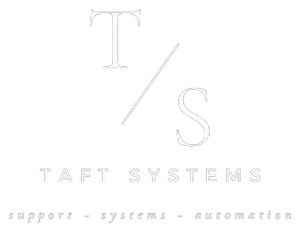
Common Misconceptions of Starting Your Own Business: The First Year
When I first started Taft Systems, I had a vision and a strong belief that with hard work, success would naturally follow. However, like many first-time entrepreneurs, I quickly learned that the reality of running a business is often very different from the initial expectations. The first year is full of challenges, steep learning curves, and yes, plenty of misconceptions. In this article, I’ll break down some of the common misconceptions I encountered during that first year of building Taft Systems and share lessons that can help new entrepreneurs avoid some of these pitfalls.
"You’ll Have More Freedom"
One of the most common reasons people start their own business is to gain freedom—whether it’s freedom over their schedule, workload, or financial situation. It’s easy to imagine that being your own boss means working whenever you want, taking vacations when you please, and controlling the pace of your business.
In reality, the first year of business is often the complete opposite. In fact, you’ll likely find yourself working longer hours than you did at your previous job. As the CEO, you’re responsible for every aspect of the business, from marketing and operations to customer service and finances. Early on, I found myself working nights and weekends, wearing multiple hats just to keep things moving.
The takeaway? While entrepreneurship can eventually offer flexibility, the first year often demands more time, energy, and commitment than you expect.
"If You Build It, They Will Come"
Many entrepreneurs believe that once they launch their product or service, customers will naturally flock to them. You might assume that simply having a great product will be enough to generate sales and that word-of-mouth will spread quickly.
This couldn’t be further from the truth. Building a business—especially in the first year—requires proactive marketing, outreach, and relationship-building. Even the best product won’t sell itself without a solid marketing strategy. When we launched Taft Systems, we quickly realized that getting in front of our target audience would take a lot more effort than anticipated. We invested in content marketing, email campaigns, and networking to build our client base, but it took time to see results.
So while product development is critical, marketing is just as important. You need to actively promote your business, build a strong brand presence, and engage with potential customers through various channels.
"You Can Figure It All Out as You Go"
While there is certainly a lot of learning on the job, many new entrepreneurs underestimate the planning and preparation needed to build a successful business. It’s tempting to think you can dive in, figure out operations along the way, and adjust your strategy on the fly.
While agility is important, lack of planning can lead to serious problems down the road. In the first year at Taft Systems, we learned the hard way that insufficient financial planning led to cash flow issues. We had a clear vision for growth, but not enough foresight about the expenses that would arise along the way. According to U.S. Bank, 82% of small businesses fail due to cash flow mismanagement.
Before launching your business, invest time in creating a detailed business plan, including financial projections, marketing strategies, and an operational blueprint. Having this foundation will help you stay on track and anticipate potential hurdles.
"You Don’t Need to Spend Money to Make Money"
Another misconception is that you can start a business on a shoestring budget and grow it without significant investment. While it’s true that many successful entrepreneurs start lean, it’s essential to recognize that investing in your business is often necessary for growth.
In the first year, I hesitated to spend on key tools and services that would have helped scale Taft Systems faster. Looking back, I see that those investments—whether in marketing automation tools, a professional website, or hiring additional staff—would have saved us time and allowed us to focus on scaling.
In fact, Harvard Business Review notes that while starting lean can be smart, strategic investments early on often determine a business’s ability to compete and grow. The reality is that certain expenses are critical for long-term success, and trying to cut corners can lead to missed opportunities.
"You’ll Start Turning a Profit Right Away"
Many new entrepreneurs assume that once the business is up and running, it will quickly become profitable. However, it’s important to remember that most businesses take time to turn a profit. In fact, the first year is often about laying the foundation, building brand awareness, and developing a loyal customer base. It can take several months, if not years, to generate consistent profits.
At Taft Systems, we spent much of the first year reinvesting revenue back into the business. From improving our product offering to ramping up marketing efforts, profitability wasn’t our immediate goal—it was growth. Small Business Trends reports that only 40% of small businesses are profitable in their first year, so it’s important to have realistic expectations.
The key takeaway here is to focus on long-term sustainability and growth rather than immediate profits. Prepare for a slower financial build-up and create a financial buffer to carry you through leaner months.
"You Have to Do Everything Yourself"
In the first year, I made the mistake of trying to do too much on my own. By spreading myself too thin, I wasn’t able to focus on the core activities that would help grow the business. Eventually, I learned to delegate tasks to my team and hire specialists for areas outside my expertise, such as financial management and digital marketing.
Entrepreneurship doesn’t mean doing everything alone. In fact, its been said that successful founders recognize the importance of building a strong team and trusting others to help them grow. Surround yourself with the right people, whether it’s hiring employees or bringing in contractors.
Starting your own business is an incredible journey, but it’s not without its challenges and misconceptions. During my first year with Taft Systems, I learned that entrepreneurship requires more time, effort, and planning than I initially imagined. You won’t have immediate freedom or profits, and success often comes from strategic investments, detailed planning, and building the right team.
Ready to avoid the pitfalls of entrepreneurship and set your business up for success? Let’s discuss your strategy and goals. Book a Discovery Call at TaftSystems.com/Discovery-call or email us at [email protected].














